Part 10—
The Conquest until Siwañ Wa'aki
The final text of this part is the earlier mentioned conquest of Siwañ, or Black Sinew Siwañ, at a great-house near the present village of Casa Blanca. The story as told by both Thin Leather and Smith-Allison has a feature not mentioned in the introduction to part 9, namely, a bridge into post-Hohokam, specifically Apache, war-burdened times. The bridge is as follows. Both Thin Leather and Smith-Allison state that the Hohokam chief had a son who was taken in by the Pima-Papago. According to Thin Leather, the boy was called Kokoñip;[a] Smith-Allison do not state his name. Also according to Thin Leather, the boy married a Pima-Papago woman named Pu:l, or Hu:l, Ha'akam;[b] Smith-Allison do not tell this part of the story. While she was expecting their first child, Thin Leather continues, Kokoñip went deer hunting alone and was killed by Apaches. The son grew up to be a vengeful warrior named Pad A:ngam.[1] His career is recalled in war oratory published by Russell (1908: 353–356), Lloyd (1911: 180–182), and Saxton and Saxton (1973: 178–182; 183–186).
Thus we have a story that runs for three generations, the first and only in the entire mythology. It is far from a normal family history. The vengeful warrior's grandparents are Hohokam on one side and Pima-Papago on the other. His father is a Hohokam orphan, and his mother is Pima-Papago. He is himself an orphan due to his own father's
[a] A name I cannot translate or analyze etymologically. Although it sounds like Pima-Papago, it does not seem to have linguistic or lexical meaning. Most personal names do have such meaning, e.g., Elder Brother, Earth Doctor, etc.
[b] The first word is untranslatable, which is perhaps why it was recorded differently by Russell and Saxton and Saxton. The second word means "Has-pottery," or "Pot-haver."
death. There is no reason to believe that the mixed parentage was regretted or disapproved of by the tellers, but there is good reason to believe that they regretted the double orphaning: it is a sad boy who loses his father, who also lost his father, to warfare.
In this already long book, I will not reproduce the texts that express that sadness. They include war oratory as well as prose. I do, however, underscore the change of mood between the Hohokam conquest stories and this story with its two generations of doomed fathers. The Hohokam chief, the first of the doomed, flees with his son from his destroyed great-house. The pair are hunted down by the Pima-Papago. The chief tells his son to hide while he faces his death. He does not die boastfully but is pitifully dispatched once his magic power has run out. It is a merciless fugitive death story.
The son's doom comes similarly. While out hunting, he is scalped and disemboweled by Apaches. In other words, gone are the days of the massed army, castle-busting Hohokam conquest, and begun are the days of the killing of isolated hunters and gatherers. The post-Hohokam era, when it was dangerous for individuals to leave home alone, has begun. This was the era that the Europeans actually observed, starting with Manje.
Story 20—
Siuuhu's Revenge:
Mescal Painted Chief
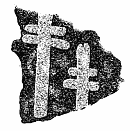
The Wooshkam went on and made camp and asked the medicine men to look ahead. At this stopping place they [rather than the medicine man] sang some songs for a medicine man who was going to work and find out what was ahead of them. He found out that among these [enemy] people was a chief who
was going to grind mescal,[2] get the juice out, mix the juice with red paint, and paint himself with it. That is what the Wooshkam medicine man saw. He sang songs about what he saw and told his people about it:
Toward the rising of the sun
There lies some land
From there I looked over here
And saw a man
Painting himself.
Toward the setting of the sun
There are mountains with steep cliffs
And on these cliffs
I saw a man with stripes of paint
On his face.
They came down to the place where they saw this man and destroyed some of the people, but some of them they captured to themselves.
Story 21—
Interlude:
Water Plume and Himmult
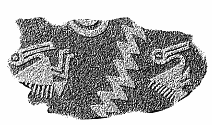
After they destroyed everything there, they made camp for a while, and they had a little trouble among themselves. The trouble was this. In the world where these Wooshkam came from, people lived in
different, separated groups just as we do here now. There was one leader for each district, or group. Now, it happened [after the emergence] that the leader of one group was named Schroduk see oo da kum, "Water Plume."[c] He was very good at hunting, a sharpshooter, and so his people knew he had the power to kill.
As the people traveled, these [Water Plume's] people were killing the best game, deer and birds, and they were selfish in their understanding toward others. Then the other people took this power away from them [Water Plume's band or tribe], and they took it away from another tribe, too.

The name of the leader of the other group was Himmult. When these two chiefs found what had been done to them, they went to a medicine man and told him their troubles in prayers. One of them gave the medicine man a soft feather, and the other gave him a bead. Then Water Plume sang a song.
Then Himmult sang.
The medicine man got the soft feather and bead and held them up in his hand. He held the hand on his
[c] Su:dagi[*] Siwudkam, 'Water Plume-having', 'Water Feather-having', or 'Water Flame-having' ("siwud " can mean "plume," "feather," or "flame"). This water-associated chief does not violate the rule that the conquering army lacks wetness power. This man's water power is stripped from him.
breast, and then he straightened up—he'd been bowing down.[3] Then he sang to Water Plume.
Then he sang to Himmult (song means same thing), and then he restored their understanding. They went away and hunted and killed and were free from then on.
Story 22—
Siuuhu's Revenge:
Hat Mountain Pause
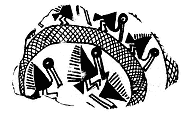
The whole Wooshkam [tribe] moved on and came down to a certain mountain which is called Wonnum (Hat).[d] (Its location is unknown.) They were getting close to where we [telling and recording this story] are today (Snaketown). When they stopped at Wonnum, they placed some of their youngest medicine people, who had never performed because they were very young. These young ones sang a song:
I am acting
Like a medicine man
I am surrounding many people
With beads.
These two young medicine people looked over here and saw that among the [Hohokam] people there
[d] Wonam , 'hat', perhaps from Spanish "sombrero."
was a leader who knew that some trouble was coming. He was getting ready. He would go each morning to look at the rising sun, and he had two of the rocks that the Hohokam medicine people used at that time. These rocks shone bright and were terrifying.
So one morning he went out and stood on top of his house and sang:
It was a white morning
In this I came out
With a shining heart.
The green evening (hod nuk)[e
] It is shaped like a windbreak (oon ma, old word ; uk
sa, new word)[f
]And in that I came out
With the green mind.[4]
This man looked dangerous, like fire, to the Wooshkam medicine men.
And all this time Earth Doctor, who was left on the other side of the world, knew that the Wooshkam were scared of the Hohokam and that they were staying a long time at this place [Hat Mountain] where they had stopped. He got his cane and shot it through the earth. It came out where the Wooshkam were camping, and it had eyes on it, like a person.
[e] Hudnig[*] , 'descent', 'sundown', 'evening', 'west'.
[f] O:nma, u:ksa[*] , two words for roofless, windbreak enclosures.
When the Wooshkam people saw this cane, they sang:
Come all you people
And see
A green cane has come.
The cane went back in the ground and came out over here, under the Hohokam, looking around. The Wooshkam then sang another song:
My crooked stick went
And came out toward the setting sun
And it came out
Over there.
And my enemies saw it
And they talked about it
And they laughed at it.
Then:
It was my thin stick
Which went toward the setting sun
And came out over there
It was my enemy, a woman
Who came and saw it and
Laughed at it.
When it came out over here, it destroyed all the power of the medicine men who had the two terrifying shining rocks.
The next thing they [invaders; Siuuhu's people] sent here was a rattlesnake. It went on top of the house
where the medicine man went every morning. The next morning, when he went to look for the Wooshkam, the rattlesnake bit and killed him.
Just before the Wooshkam started to come this way, they told their children how they should live if they [parents] were killed or destroyed, and they set a rule for their children and wives. And they sang:
Sivain i vah ki (Siivan, man ; vahki, house; so
"Siivan's house")[g] is
Making me mad
It is far away
We have many days to go yet.
Siivan i vahki, you are
Making me mad
Away ahead of us
We can see dimly
Many mountains.
They hadn't moved yet. They asked two more medicine men to work for them. One of them made a raven which he sent to the Siivan, and he sang:
You have made a raven out of me
I am now hanging above vahki
And I am making my enemies' heart
To go to sleep.
[g] Sivañ , 'chief'. This is the same word that was spelled "Sivain" earlier in the manuscript. There it appeared to be the personal name of a man living in Vahki in the Mesquite, near Glendale, Ariz.; wa 'aki , 'great-house'. In this passage, it seems that the Pima village Casa Blanca is identified as a chief's great-house.
The raven came down where Siivan was. The siivan had some sons who ran out of the house and tried to shoot the raven down, but this raven was not a real bird.
The other (Wooshkam) medicine man worked and pulled some komitch kaduk (hair from the temple, an old word) and made a snake out of it. He sang:
You have made a snake out of me
I am tying
The hands of my enemies.
This snake came down where Siivan was and tied his hands together.
The evening before they were to start, the Wooshkam held a meeting to plan how they would fight the people down here. Some said that they must kill all the people that they had already captured, or these people might turn around and help the Hohokam. They finally decided they must not kill them but watch them very carefully Then they [invaders] asked another medicine man to work for them. He had the power of the bluebird and sang:
Bluebird medicine man
You called me
To the land that lies before me
I am breathing.
I am tying the hands
Of my enemies.
Story 23—
Siuuhu's Revenge:
Casa Grande Ruin
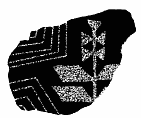
There were two [enemy] men living at the house that today is called Casa Grande Ruin, and they had wives. When they got up one morning, the men's and women's hair were tangled, and they had to break loose from each other.
When they [enemies





And they sing:
I am now going around
And the enemy are scared
They are leaving their quivers
And running away.
I am running
And my enemies are afraid of me
They are leaving their sons
And running away.
The people with their hair tangled were brothers. As they got ready [for the coming trouble], the oldest worked and created a big whale.[7] He put it in the direction that the Wooshkam were to come, for protection. When the Wooshkam came to where the whale was lying, it acted very dangerous. They
didn't come any further, but stopped right there. The younger brother also put one in their road. (The older brother's name was Han de mutch, Feather running. The younger's name was Vee ky mutch, Soft feather running.)[h]
When one of the Wooshkam medicine men found what these men were doing, he sang:
Running feather
You've made a whale,
Close to this whale
The wind is twisting.
Soft feather running
You've made a whale
On the back of this whale
The clouds are twisting.
When the songs ended, they sent some young men to these whales. They stuck a bunch of sticks in one whale's mouth and killed it.[8] The other whale they would kill by hanging.
The people who lived at the house at Casa Grande ruins came out of the house and went to a mountain called kok chut (curled up). The Wooshkam found them there and destroyed them. That is why the house [today's national monument] is not wrecked like the others: they did no fighting there.
[h] Probably A'an Melc, 'Wing-feather Cause-to-run', and certainly Wi:g Melc, 'Down-feather Cause-to-run'.
Story 24—
Siuuhu's Revenge:
Yellow Soft Feather Plume
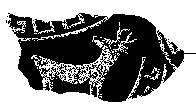
When they killed all those people, they came to a place just east of Casa Blanca (where there is a small mound). The man who lived there was a sharp-shooter who always hit his mark, didn't know what missing was, and always killed what he hit. His name was Suam veek sil da kum—Yellow soft feather plume.[i] When they got there, they surrounded his house, but they didn't come very close.
The man came from his house, and he shot arrows and killed people. The Wooshkam told their captives to go first, so the man was killing his own people. They saw that his arrows were as fast as lightning. They were frightened and sang:
Another land,
Yellow soft feather plume,
Around your arrows
Are flying fast.
Another mountain
I give you a white bead
In that a striped bow
Is running near.
[i] S-uam Vi:g Siwdagkam, 'Yellow Down-feather Plume-having'. These shooting skills would seem to place this Hohokam on the solar side. He is a background adversary, not one of the principal ones.
Then a medicine man who had the power of thunder worked and killed the sharpshooter, but he had killed a lot of people.[9]
Story 25—
Siuuhu's Revenge:
Siivan I Vahki
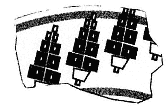
Now they came to Siivan i Vahki at Casa Blanca. The man Siivan went into his house with all his people. The Wooshkam watched him and said, "You come out like a man. You're not a woman to stay in the house." Some of them said, "Maybe he's not home, and that's why he doesn't come out."
Four different kinds of fog surrounded the vahki so the Wooshkam couldn't see it. They told one of their medicine men to roll a cigarette and breathe and find out if he [Siivan] is in there. The medicine man did this and saw Siivan inside with his hands tied by a snake and unable to do anything. The medicine man sang:
Vahki is built of clay
In it I saw
A medicine man.
He is afraid of me
He is staying in there
The vahki is made of clay.[10]
The people inside the vahki were shooting their arrows through holes made in the walls for that purpose, and they were killing the people outside. They fought for four days. Then they [Wooshkam] searched for a child who had become an orphan, whose [recently] dead father and mother were powerful medicine people.
Meanwhile the people inside the vahki looked out and said [insultingly] that the "plate-licker" (was a a viñ oo ma dum )[j] couldn't do anything. Then the child pulled one of his hairs, held it between his hands, and threw it crossways to the vahki, which it hit and broke. The vahki fell down, and that was the end of Siivan.
After they killed this man, who lived here at Casa Blanca, they came to his body to search it and make sure he was dead. They asked a medicine man to work over the body and be sure he was dead, because they had heard a lot about the power of these Hohokam people. The medicine man sat down to work and sang:
I am now sitting down
And my power is shining forth
I saw rainbows.
The medicine man said that the man was dead, the understandings that he had were gone, and the
[j] Huas-ha'a Wiñumdam, 'Pottery-plate (literally "basket-pot," a post-Hispanic neologism used to describe European-style pottery table goods) Licker'.
things that he used were just shining dimly. All that the medicine man could see [of Siivan's things] were just colors like a rainbow. The people cried out that they must destroy this last little bit of understanding, that shows in the rainbow colors. Then the medicine man sang another song:
I am holding my hand
And with my cane
I have destroyed the understanding
Of this medicine man
And the stones that he used
Are now coming out in black colors.
Story 26—
Siuuhu's Revenge:
Downstream

From there the medicine man looked over this place here [Snaketown] and saw that some people left here and went west, but some remained. So they [Wooshkam] moved down this way, came here, and destroyed everything that was here. Then they gathered some big rocks and placed them on the ruins of the houses. This was to show that the people who had lived here were powerful. No one [Wooshkam] was killed.
Story 27—
Siuuhu's Revenge:
Ocotillo Foundation House
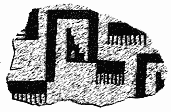
The Wooshkam made camp here [Snaketown] and then saw that ahead of them lay a great body of water that no one could cross. The man who had made this water lived just north of here (perhaps the "tanks" north of Higley, Ariz.). The Wooshkam asked a medicine man to find out why the water was there. The medicine man was named Judum nam kum (a man that has the power of a bear).[k] He worked and found that there was a house there [at the water

I saw ahead of me
A house which has
A foundation of muhluk.
I saw a house ahead of me
I have now learned
That this house is there
And the roof of this house
Is made of ocotillo.[11]
The Wooshkam went down and found that there really was no water between them and the house. The man who lived at the house had fooled them to
[k] Judum Namkam, 'Bear Meeter'.
[l] Melhog , 'ocotillo' (a kind of cactus).
make it look like there was water, which was really a mirage (co 'o at ju ki ).[m] When they got to this house, they fought for four days and nights with no food but with water to drink. Finally they destroyed some of the people there and captured and made prisoners of the rest.
Story 28—
Siuuhu's Revenge:
Guadalupe and Pueblo Grande
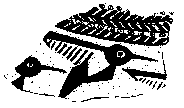
They made camp there and asked another medicine man to work for them. He had the power of the bluebird, Huh wut jut nam kum.[n]
The bluebird man found out that ahead of them lived a chief with many people, at a mound that is somewhere a little north of Yaqui Village (Guadalupe, Ariz.). (The medicine man sang two songs, but Juan has forgotten them.) The house at this mound was destroyed.
The bluebird man worked some more and looked in the same direction and saw that it was raining very hard at a spot just across the river from where the previous enemy man was (Guadalupe). This spot
[m] Ku:jegi , 'mirage', 'heat wave' (as over a road) (Saxton, Saxton, and Enos 1983: 35).
[n] He:wacud Namkam, 'Bluejay Meeter'.
was where Yellow Buzzard (Huam a nui)[o] used to live (Pueblo Grande).[12]
This man had made his house from solid rock, so it seemed impossible for the Wooshkam to hurt it. He had done this because he didn't want any of his people to run off and leave him. They must all stay in this house with this medicine man.
It wasn't really a stone house, but the leader made it look like solid rock.
The bluebird man fooled himself by saying that the house was made of rock, and he couldn't do anything with it, so they asked another man who had the power of thunder to see what he could do (Chu din nam kum). He sang:
It is a hard house
It is a hard house
It is a hard house
Do you see the foundation
It is made out of rock.
Then he told the people that it [destruction

I saw that he is
Too light for me.
[o] Uam Ñu:wi , 'Yellow Buzzard'.
[p] Ma:kai , 'medicine man', 'shaman', 'doctor'. This is a different word from siwañ , 'chief'. Smith is not alone among narrators in holding that the Hohokam had "medicine men" as well as "chiefs." The contemporary Pima-Papago, however, and also those who emerged from the underworld, had only medicine men. They have no chiefs, that is, no sisiwañ.
It is like a windbreak (oksha, four walls, no roof,
shelter for cooking)
Made out of these ocotillos.
It was true. The thunderman came down over the house and smashed it to pieces. When this happened, the earth quaked and it knocked down a house that was close to the city of Phoenix (La Ciudad

Story 29—
Interlude:
Arrows from the South

After they destroyed this house (Pueblo Grande) where Huamanui lived, they made their camp there and asked another medicine man to find out what was ahead of them (Juan doesn't remember what power this man had). He looked west and saw a distant cyclone or whirlwind that was pulling out trees by their roots. This frightened the Wooshkam. They decided to stay there for a while and make plenty of arrows to prepare to fight the people who were ahead of them.
All this time there was another company of Wooshkum who had gone south from here [see story 18] and were not fighting very hard. They had plenty of weapons with them because there were not so many
people in that country. Among this group was a medicine man called Siu duk wy nam kum, Power of the blue deer.[q] He saw that the people who had come this way [now resting at Pueblo Grande] had been fighting hard, that their weapons were getting scarce, and that most of them were killed. He sent a woman to bring them some arrows.
When the medicine man (one of those to the north) saw her coming with arrows, he knew they were for the Wooshkam, and he sang:
The woman is getting closer
The woman is getting closer
Don't you see her
All you people
She brought the arrows, and they distributed them.
Story 30—
Siuuhu's Revenge:
Sivern, his Box, and the Handsome Young Boy

During all this time, the man Sivern [probably the same as the Siivan of story 25], who was living there [somewhere], was getting ready, and he told his child to get his va sha (box).[r] He got the box, and somewhere where Sivern had a piece of land, where
[q] S-cehedagi Hwai Namkam, 'Blue Deer Meeter'.
[r] Vasa[*] , 'covered box', 'suitcase', 'oblong-plaited-basket-with-cover'.
he planted his crops, Sivern took the child and the box. He put him somewhere and covered him up. He left the child, telling him, "You must lay here all the time. You will notice the wind blowing. If it keeps blowing, I'm alive, but if it stops, you will know I am dead. Then you go and look for my body. When you find it, cut me open, and down in my heart you will find a shining stone. Take it. Then you must follow the Wooshkum people. Wherever they camp, you go and circle their camp till you find out where there is a small group gathered separately. You go and make company with them. Then you'll find out if they'll keep you or kill you."
There were four [Wooshkum] medicine men who worked and made the strong cyclone, or wind, [of Sivern] become gentle. It was easy for them. But the medicine man, Sivern, got half of the power of the strong wind and closed it in his box. The other half was the wind that the Wooshkum saw [story 22

When Sivern saw that the power of this wind was going down, he spoke, "I thought I was more powerful than anybody else, but now I see that there are people more powerful than me." Then he cried and sang while crying:
Way off you can dimly
See the wind standing
In that my heart is dying.
The clouds are all gone
My mind is all gone.
While he sang, the clouds came close to the earth, and the Wooshkum couldn't see where this man was. They got the man who had dreamed the song of this Sivern when they first came to the ocean from the east [story 16]. When this man was ready, he sang:
I am now sitting down
I am now singing the song of Sivern.
I am now standing
I am learning the song of Sivern.
Then he sang the song which is Sivern's:
The sun is coming up
It's shining through the va pa ki (houses).
He saw that Sivern went out of his house and was moving in some direction. The Wooshkam made lightning to kill Sivern, but it did not hit him. (Sivern or Sivanyn , a word meaning medicine man). He went underground somehow and came up someplace. They tried to hit him again, but he went down, and they couldn't do it. Then he came up close to where he went down. This time thunder tried to hit him, but he went down again. Then he came out again, and this time he was walking. He was not a medicine man anymore but just like any other person.
Then it was not a medicine man who went after him, but some of the people who were good with bows and arrows. They went down [there] and killed him.
The fighting went on for four times four days (a sacred number, with a special word, "gee ko chiu moi duk ").[s] After they killed this man, the sun went down, and they made camp for the night. The wind stopped blowing where the child was with the box, and he came out and did what Sivern had told him to do. He circled the camp and found a group of people by themselves. He came to them, and it happened that one was a medicine man, sitting by the fire. This man said to the people who were there with him, "Look behind me. Somebody is standing behind me."

When the people looked they saw nobody standing there. The man told them to look four times, and they still couldn't see anything. Then he reached with his hand behind him, and surely there was the child with the box.
The people saw that he was a handsome young boy (skugut viap pwuh ).[t] The people talked among them-
[s] Probably gi'iko ce:mo'oidag , 'four-times completion', 'four-times permeation'.
[t] S-keg viapoi , 'handsome (or 'good') boy'.
[u] Hu:hu'ula, a "dialect group" of Pima-Papago. They live in the northwest part of today's Sells (or Papago) reservation and are the core residents of today's Ak Chin and Gila Bend reservations.
[v] This word is probably kiikam , which simply means "resident." Thus, it is probably not, as one might hope, a hitherto undisclosed name for the Hohokam.
selves and said they must not tell everybody about this lad that had come. They must keep him secretly.
The next morning the [entire Wooshkum

Supplement
Black Sinew Chief, his Basket, and Kokoñip (Thin Leather/Russell)
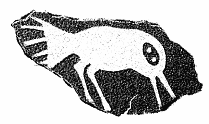
[The Pima-Papago army moved toward the great-house at Casa Blanca, home of Black Sinew Chief.] They then attacked Tcotcuk Tatai Sivan,[w] who was the most powerful of all the chiefs who ventured to oppose them. He knew that they would defeat him, yet he struggled bravely to save his people and at the last to save himself.
He first took some soot from his chimney, powdered it in the palm of his hand, blew it into the air, and darkness immediately fell so dense that Elder Brother's warriors could see nothing.
Tcotcuk Tatai Sivan then threw down his dwelling and made his way through the midst of his enemies.
[w] Cucuk Tatai Siwañ, 'Black Sinew Chief'.
But the god of darkness [i.e., the lightmaker, working for the invaders] dispelled the night, and the escaping leader was seen in the distance. Elder Brother's warriors succeeded in getting ahead of him and were about to surround and kill him when he wiped the tears from his eyes and blew the drops among the men about him. This produced a mirage which concealed him from view. But the god of mirage [the heatmaker, evaporator of moist mirages] caused the veil to lift, and again he was seen fleeing in the distance.
Again Tcotcuk Tatai Sivan was headed [off] and in danger; but this time he took out his reed cigarette and blew puffs of smoke, which settled on his pursuers like a heavy fog through which he continued his flight. The god of fog [dispelling] drove it into the sky and he was seen escaping.
He now realized that he had but one more chance for his life. When the fog had formed clouds in the sky he took his belt and threw it upward and climbed up and laid himself against the clouds as a rainbow. It was impossible for the god of the rainbow unaided to bring him down; he made several unsuccessful attempts before he hit upon the expedient of making some spiders, which he sent after the rainbow. They formed a web over the bow and brought it to earth and destruction.
Elder Brother's soldiers were so astonished at the prowess of Tcotcuk Tatai Sivan that they thought he
must have a strange heart, so they cut it open to see, and, sure enough, they found within it a green stone about the size of a bullet. The stone is kept to this day in a medicine basket which they captured with his grandson.
Before he had undertaken his flight he had told the boy, Kakanyip, to go with his basket and hide under a bush; after the grandfather should be killed the lad should come, touch him, and swallow the odor of the body, and he would acquire the power of the Siwañ. But a warrior named Shohany discovered the little Kakanyip, and after a time sold him to the Papago chief Kak Sisiveliki,[x] Two-Whirlwinds. The box is yet kept by the Papagos living 30 miles south of Gila Bend. If it is disturbed a severe storm is produced and cold weather prevails in Pima Land. (Russell 1908: 227–228)
Supplement
He Great Doctor's End (Thin Leather/Lloyd)

And then they [invaders] went on to where the Casa Blanca vahahkkees now are in ruins; and the great doctor who lived there [Black Sinew Chief], the same who had sent his boy to inquire of the proph-
[x] Go:k Sisiwelig, 'Two Whirlwinds'.
ecies [on the coming invasion], drew a magic line before his place, so that the enemy could not cross. And when Ee-ee-toy's men came to the line the earth opened, and they could not go further till one of their great doctors, by his power, had closed it, and then they could pass it.
And they had a great battle there, for the place was very strong, and hard to get into. And there was a doctor among them called Nee-hum Mahkai,[y] and they asked him to use his magic power to tear the place down, and he tried but could not succeed. And they asked another, called Tchu-dun Mahkai,[z] or Earthquake Doctor, and he tried and failed also. And then they asked another little man, not supposed to have much power, and he took a hair from his head and held it up by the two ends and sang a song and turned it into a snake. And he sent the snake, and it struck the house and shook it so it broke and fell down from above. And then Ee-ee-toy's men took the place and killed everybody there except Tcheutcickadahtai Seeven,[aa] who escaped and ran on.
And one of Ee-ee-toy's warriors pursued him and was going to strike him with a club, when he sank down, and the place where he sank was filled with fog, so they could not see him, and he got out on the other side and ran on. But they had a doctor called
[y] Probably Wuihom Ma:kai, 'Lightning Medicine Man' [or 'doctor'].
Cucuk Tatai Siwañ, 'Black Sinew Chief'.
Ku-mi-wahk Mahkai,[bb] and they had him clear away the fog, and then they could see him and chased him again.
And again, when about to be struck, he sank down, and a mirage filled the place so that they could not see him, for things did not look the same. And he got out beyond and ran on. And they had a Saskatch Mahkai,[cc] or Mirage Doctor, who cleared away the false appearance, and again they chased him and were about to kill him, when again he sank.
And this time a rainbow filled the place and made him invisible, and again he ran on till their Kee-hawt Mahkai,[dd] or Rainbow Doctor, removed the rainbow. And then once more they were about to strike him when he sank, and the quivers which heat makes, called coad-jook,[ee] filled the hole, and again he got away. But they had a Coadjook Doctor, and he removed it, and then they chased him and killed him. (Lloyd 1911: 156–158)
Ko:mhaiwa Ma:kai, 'Fog [wet, misty] Medicine Man'. Here and in the next two instances, a person who counters the thing in question, e.g., who counters fog.
Saskaj[*] Ma:kai, 'Mirage [waterlike] Medicine Man'.
Kiohod[*] Ma:kai, 'Rainbow Medicine Man'.
Ku:jegi, 'mirage' (as waves over a paved road), 'heat waves'.